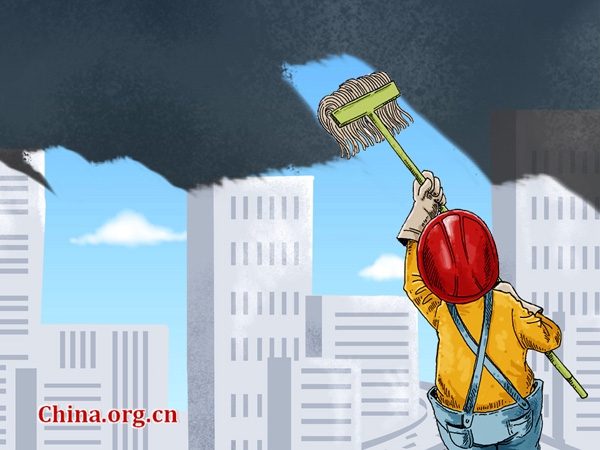The Paris Climate Change Conference - China takes a leading role
- By Tim Collard
 0 Comment(s)
0 Comment(s) Print
Print E-mail China.org.cn, November 29, 2015
E-mail China.org.cn, November 29, 2015
|
|
|
Washing away the dark clouds [By Zhai Haijun/China.org.cn] |
The world's tortuous progress towards the achievement of a comprehensive global climate change agreement takes a further step with the 2015 U.N. Climate Change Conference in Paris from November 30 to December 11. Clearly there is a need for a leading role to be played by China, the world's largest emitter of greenhouse gases; and President Xi Jinping will attend the opening ceremonies to demonstrate the extreme importance which China attaches to this project.
In accordance with the requirement that the leading players on the climate change issue should issue their national plans in advance of the Paris conference, China's plan was announced in June of this year, in the context of a meeting with French President Hollande.
China has already pledged to achieve peak emissions by 2030. This will involve a reduction of carbon dioxide emissions per unit of GDP by 60-65 percent from 2005 levels, while after 2030 a steady reduction will be maintained. To fit in with this purpose, China is also positioning herself as a leader in the development and deployment of clean energy technology and has become the world's largest renewables market. China has now committed herself to sourcing 20 percent of her energy needs - virtually equivalent to the entire energy requirements of the United States - from clean energy sources by 2030.
This is a potentially revolutionary development. The problem for the climate change issue has always been an unevenness of political will. Western countries, beginning with Britain in the 19th century, have pioneered most forms of industrial development, but became the world's leading polluters in the process. Now the developing world, trying to catch up, argued that the equal application of strict emissions controls would prevent the catch-up and perpetuate the existing inequality. The developed world, led by the United States, feared that unequal controls would damage the competitiveness of their own industries. It was this impasse which scuppered the Kyoto agreement and caused the collapse of talks at the Copenhagen summit in 2009.






